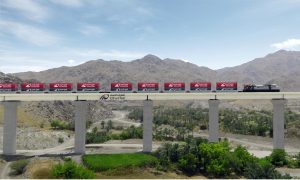Etihad Rail agrees to build Jebel Ali Port terminal
Intermodal port terminal will have the capacity to handle 5 million TEU’s per annum by 2030

Etihad Rail, the master developer and operator of the UAE’s national railway network, has announced an agreement with DP World to develop an intermodal rail terminal in Jebel Ali Port.
Intended to provide a more efficient transfer of containerized freight arriving at the port, the proposed terminal will bring a number of benefits to logistic companies operating the country and to the UAE economy as a whole said Nasser Al Sowaidi, chairman of Etihad Rail, after signing a memorandum of understanding with Sultan Ahmed Bin Sulayem, chairman of DP World.
“This MOU with DP World is a key milestone in securing Jebel Ali Port as an integral part of the Etihad Rail network, and represents a significant step forward in the network’s overall development,” he said.
“Our collaboration with DP World in creating an intermodal rail terminal inside Jebel Ali Port will enable the efficient transfer of containerised freight from ocean vessels onto the rail network and vice versa, ultimately driving the economic growth of the UAE, while also being closely aligned with the UAE Vision 2021 and Abu Dhabi Vision 2030,” Al Sowaidi added.
DP World has already marked out a substantial plot for the terminal, adjacent to Jebel Ali Terminal 1 and close to Terminal 2. The team at DP World will oversee the building and operation of the loading and unloading facilities at the rail terminal, while Etihad Rail will construct and own the railway infrastructure.
In addition, the railway operator will also manage the rail services to and from the terminal.
The shift from truck to rail transportation is predicted to significantly reduce truck traffic at the port terminal and the roads surrounding Jebel Ali. Furthermore, it will also be more cost effective for business over long haul moves.
One Etihad Rail train will carry up to 260 TEU’s (twenty foot equivalent container units), which, if transported by road, would require at least 130 trucks. By 2030, it is expected that the Jebel Ali rail terminal will have the capacity to handle the transfer of 5 million TEU’s per annum.
“The rail terminal and the Etihad Rail network as a whole will add significantly to the efficiency we can offer customers at Jebel Ali port. With facilities at Jebel Ali able to serve the largest vessels in the world, supported by the latest e-trade technology, and the Dubai Logistics Corridor linked to the Dubai World Central airport, Jebel Ali will be fully multi-modal, connecting sea-road-rail-air,” Sultan Ahmed Bin Sulayem, chairman of DP World said.
“This will add enormously to the efficiency of the supply chain and reinforce Dubai’s status as both a regional hub and a gateway for cargo for the UAE and the wider Middle East, subcontinent and East Africa region,” he added.
Upon completion, the Etihad Rail network, which will cater to both freight and passenger transport, will span a total of 1,200km across the UAE. It will also form a vital part of the GCC Railway Network, linking UAE to Saudi Arabia via Ghweifat in the west and Oman via Al Ain in the east.
Al Sowaidi added that this MOU with DP World was the latest in a long line of agreements with other major trade partners in the UAE and beyond.
Last October, the railway operator signed a formal agreement with ADNOC to help in the transfer of sulphur from its sources in Shah and Habshan to its point of export in Ruwais.
Etihad Rail has also signed agreements with companies such as Emirates Steel, Arkan, Al Dahra Agricultural Company, Etisalat and Du, who are all looking to use the railway as a solution to their diverse business and transportation needs.

























